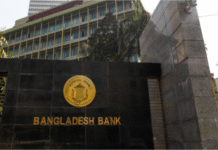Confrontational political programmes and shutdowns have started to hit pockets of general consumers as inflation edged up in April.
The Consumer Price Index, known as the main gauge to understand the swings in the prices of food and non-food items, inched up to 7.93 percent last month from 7.74 percent in March.
Separately, food inflation and non-food inflation rose, from 8.30 percent and 6.81 percent in March, to 8.57 percent and 6.81 percent in April, according to Bangladesh Bureau of Statistics data released yesterday.
Economists blamed the rise in inflation on frequent shutdowns that break the supply chain and ultimately push up commodity prices and the cost of living.
“The reasons seem entirely domestic. There is no outside influence as oil prices are relatively stable and international markets are not volatile,” said Ahsan H Mansur, executive director of Policy Research Institute.
“As the value of the local currency is appreciating, the commodity prices were supposed to go down. But that is not happening,” he said.
The economist said the disturbances in the supply chain caused by frequent shutdowns and deadly violence are pushing the costs of transport up, ultimately fuelling the commodity prices.
Mansur also said the seasonality of crops could also play a role in the rise of food inflation, as the winter crops are disappearing and the summer crops are yet to reach the market.
Also, the stocks of aman rice are thinning and the boro yields are yet to arrive.
The country witnessed 25 days of shutdown so far this year, with more on the way.
Main opposition BNP will observe hartals today and tomorrow and Islamist outfit Hefajat-e-Islam has called countrywide daylong shutdown for May 12 protesting Monday’s crackdown on its leaders and workers.
However, on average basis, inflation in April came down to 7.85 percent, which was 8 percent in March.
The rate in April is close to the government’s target at 7.5 percent set for the current fiscal year that ends in June.
Hassan Zaman, chief economist of Bangladesh Bank, however, looks at a broader picture and has credited the central bank’s monetary policy for successfully holding the inflation rate from jumping back to double digit.
“Inflation numbers implied that the twelve-month average inflation continues to fall from 10.92 percent a year ago to 7.85 percent now. The fact that non-food inflation is virtually unchanged from last month and on a downward path since last October is welcome news and in line with monetary policy goals,” he told The Daily Star.
He, however, said the recent upward trend in food inflation is of some concern and appropriate safety net interventions may be required to cushion the impact on the poor.
Source: The Daily Star










